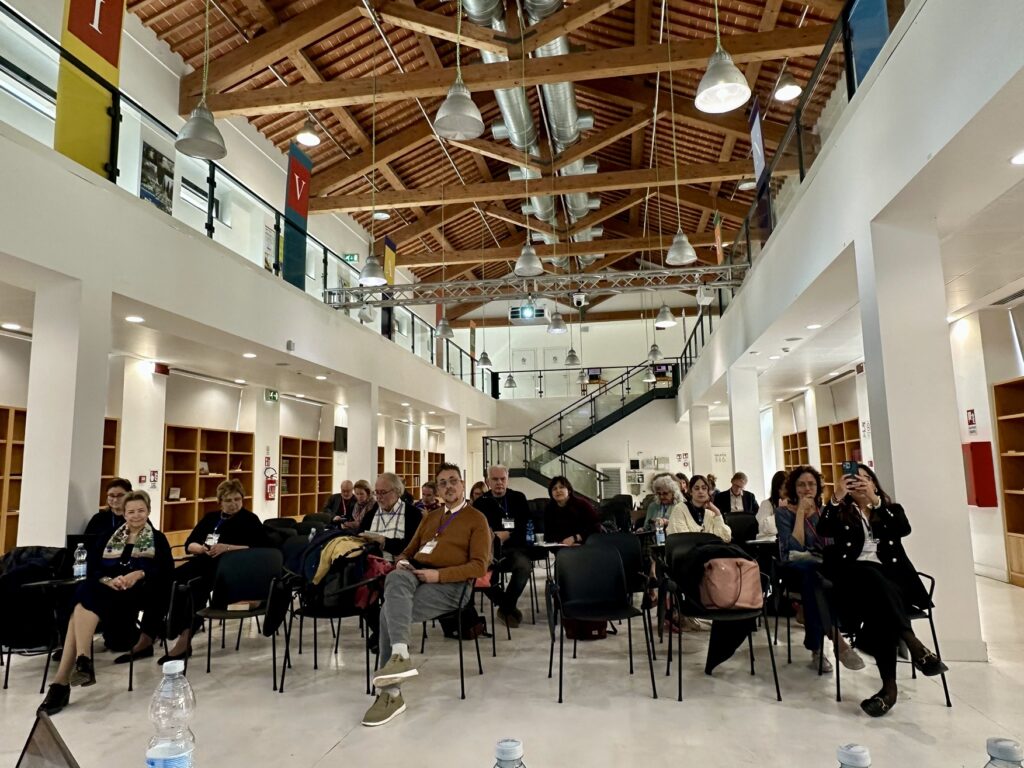A New Life for the Paratext: Jan Levchenko’s Report on a Conference in Italy
From October 15 to 17, two Italian universities hosted the conference “Rewriting European Literatures in Stalin’s Russia.” SBB lecturer and cultural scholar Jan Levchenko took part in the event. We are publishing his detailed account of it below:
The conference was organized by three universities: Bologna, Siena, and Roma Tre. It was held at two venues: the University of Bologna campus in Forlì (Emilia-Romagna) and the University of Siena campus in Arezzo (Tuscany). The hedonism was not only intellectual — participants were also treated to an excursion to the Byzantine monuments of Ravenna. This was less a form of entertainment than a refreshing interlude, which helped make the second day of the conference even more intense than the first.
Dedicated to the existence of paratexts on foreign literature in Stalin’s USSR, the conference brought together about thirty specialists from the Czech Republic, Estonia, Finland, France, Germany, Italy, Sweden, the UK, the USA, and, quite boldly by today’s standards, Russia. Unlike athletes, who are allowed to compete internationally under a neutral flag, scholars need not engage with questions of political choice at all — provided they share the consensus of the host country. In this case, the organizers assumed a responsibility that is far from universal on today’s European agenda, and this choice deserves respect. Researchers remain unique specialists in their fields, even if the country of their citizenship and residence continues to wage a war of aggression in violation of international law.
This is even more true in the study of Soviet culture. Excluding those who represent Russia as the successor to the USSR — now absorbed in attempts to restore it — would risk reproducing the same isolationism that global Russian studies were forced into during the Cold War. The Stalinist period, in both its everyday and exceptional manifestations, provides vivid material for studying the processes of cultural appropriation, which were the focus of the gathered experts, regardless of their country of residence.
According to Gérard Genette, author of the theory of paratextuality, this is a type of functional text that precedes or concludes the presentation of the main text (i.e., a preface or afterword), comments on publications, and, more broadly, includes critical articles and reviews that accumulate around a work and create the closest diachronic context of its existence. In Soviet culture, paratexts had a guiding function with regard to works of heritage that required “correct” interpretation in accordance with ideology. Soviet — and especially Stalinist — paratexts formed part of a policy of appropriating and developing the entire corpus of world culture, with the aim of proclaiming it the precursor of the “best of all worlds,” which the USSR declared itself to be.
The conference presentations covered a wide range of themes — from the parallel between the author of the Soviet preface and the guard in the GULAG (Prof. Evgeny Dobrenko) to more neutral questions concerning the reception of national literatures in different decades of Soviet history (Assoc. Prof. Illaria Aletto and Maria Zavyalova, Prof. Vsevolod Bagno, Assoc. Prof. Alessandra Carbone, etc.). A separate group was formed by monographic case studies — both at the level of foreign subjects (Assoc. Prof. Kristina Landa, Prof. Susanna Witt, etc.) and at the level of Soviet recipients (Assoc. Prof. Giuseppina Larocca, Prof. Alexander Dmitriev, and the SBB teaching fellow Jan Levchenko himself).
The conference is part of an ongoing project arising from the collaboration mentioned at the beginning of this overview. The well-organized event and the brilliantly chosen participants testify to the extensive experience already gained by the team — experience that will undoubtedly be put to good use in future installments of this series.
